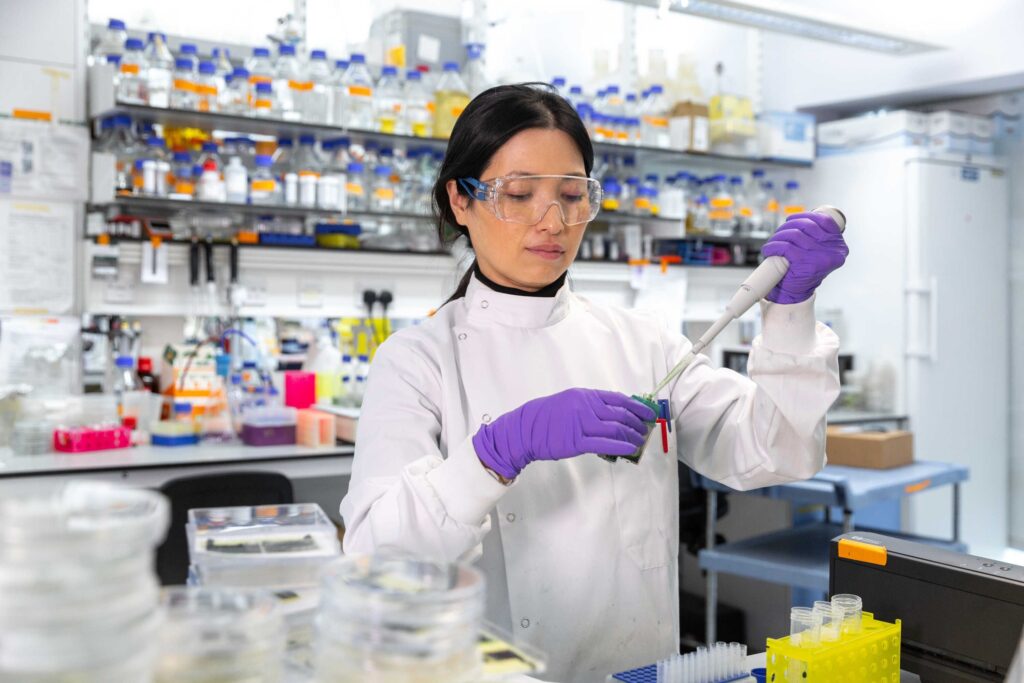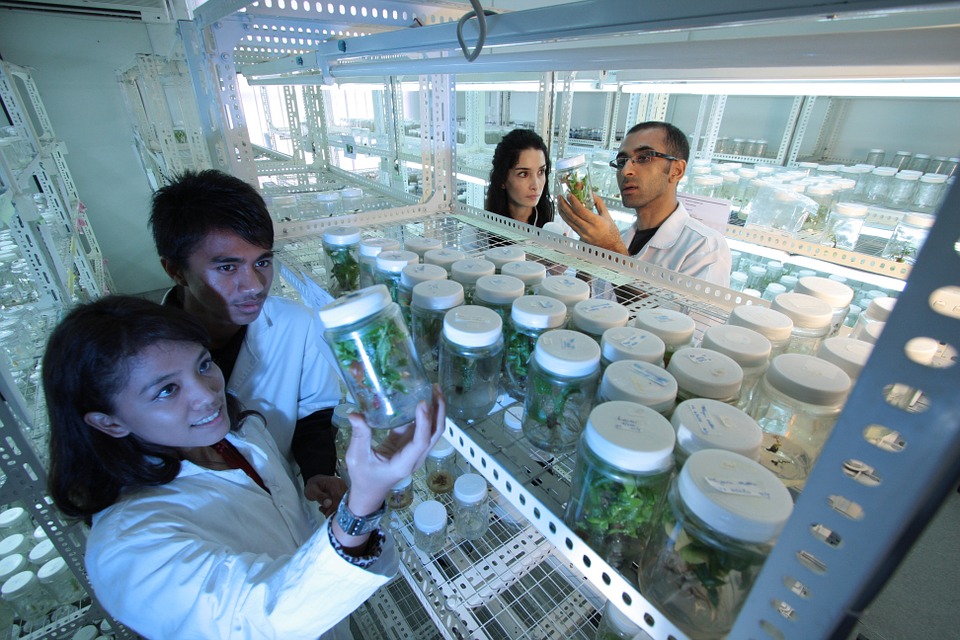To study biotechnology effectively, start with a solid foundation in biology, chemistry, and mathematics. Pursue a bachelor’s degree in biotechnology or a related field, and consider a master’s or Ph.D. for specialization. Gain hands-on experience through lab work, internships, and research projects to master essential techniques and understand experimental design. Stay updated with current trends by reading scientific journals and taking online courses.
Develop technical skills in bioinformatics and programming languages like Python and R. Enhance critical thinking, problem-solving, and communication skills. Network by joining professional organizations and attending industry events. Prepare for your career with a strong resume and by understanding industry trends. Use resources like key textbooks, PubMed, and educational websites to support your learning.
What foundational subjects are essential for studying biotechnology?

Studying biotechnology requires a strong foundation in several core scientific disciplines. Here are the essential foundational subjects:
Biology
Understanding the structure and function of cells, cellular processes, and cell signaling. Studying the molecular mechanisms of gene expression, DNA replication, transcription, and translation.
Learning about microorganisms, including bacteria, viruses, fungi, and their roles in biotechnology. Understanding the principles of heredity, genetic variation, and genetic engineering techniques.
Chemistry
Basic principles of chemistry, including atomic structure, chemical bonding, and reactions. Structure, properties, and reactions of organic compounds, which is essential for understanding biomolecules.
Biochemistry
Chemical processes within and related to living organisms, including the structure and function of biomolecules like proteins, lipids, and nucleic acids.
Mathematics
Fundamental concepts of differential and integral calculus, useful for modeling biological processes.
Techniques for data analysis, essential for interpreting experimental results and conducting research.
Physics
Understanding basic physical principles and their application to biological systems, such as fluid dynamics, thermodynamics, and optics.
Computer Science and Bioinformatics:
Programming
Basic skills in programming languages like Python, R, or Perl for data analysis and bioinformatics. Techniques for analyzing biological data, such as DNA sequences and protein structures.
Engineering Principles (for certain biotechnology applications)
Principles of chemical processes and their applications in biotechnology, such as bioprocess engineering. Applying engineering principles to the medical field, including the development of medical devices and diagnostic tools.
How do you pursue formal education in biotechnology?

Pursuing formal education in biotechnology typically involves several steps:
Research and Choose a Program
Start by researching biotechnology programs offered by universities and colleges. Consider factors such as program reputation, faculty expertise, curriculum, available resources, and location.
Look for programs that align with your career goals and interests, whether it’s in pharmaceuticals, agriculture, environmental science, or healthcare.
Meet Admission Requirements
Check the admission requirements for each program you’re interested in. These typically include a high school diploma or equivalent, standardized test scores (e.g., SAT or ACT), letters of recommendation, a personal statement or essay, and sometimes an interview.
Undergraduate Degree (Bachelor’s)
Pursue a Bachelor of Science (B.S.) degree in biotechnology, biochemistry, molecular biology, biology, chemistry, or a related field. Some universities offer specialized undergraduate programs specifically in biotechnology.
Take core courses in biology, chemistry, mathematics, physics, and related disciplines, as well as specialized courses in biotechnology, genetics, bioinformatics, and laboratory techniques.
Participate in research opportunities, internships, or co-op programs to gain hands-on experience in biotechnology laboratories and industry settings.
Consider Advanced Degrees
If you’re interested in more advanced positions or research roles, consider pursuing a Master of Science (M.S.) degree in biotechnology, biomedical sciences, or a related field. Master’s programs typically involve coursework, research, and sometimes internships or industry projects.
For those interested in academia, research, or leadership positions in biotechnology, a Doctor of Philosophy (Ph.D.) in biotechnology, molecular biology, biochemistry, or a related field may be suitable. Ph.D. programs involve independent research, dissertation writing, and often teaching assistantships.
Research Funding and Scholarships
Explore opportunities for financial aid, scholarships, grants, and assistantships to help fund your education. Many universities offer scholarships specifically for students pursuing degrees in science, technology, engineering, and mathematics (STEM) fields, including biotechnology.
Gain Practical Experience
Seek internships, co-op programs, or research assistant positions during your undergraduate or graduate studies to gain practical experience in biotechnology laboratories, industry settings, or research institutions. Practical experience is valuable for building your skills, networking, and enhancing your resume.
Stay Updated and Network
Stay informed about developments in the field of biotechnology by attending conferences, seminars, workshops, and networking events.
Connect with professors, professionals, and alumni in the biotechnology industry to learn about job opportunities, research collaborations, and career pathways.
What hands-on experiences are crucial for biotechnology students?
Hands-on experiences are crucial for biotechnology students to develop practical skills, gain laboratory proficiency, and understand the real-world applications of biotechnological techniques. Laboratory courses provide opportunities to learn fundamental biotechnological techniques such as DNA extraction and purification, PCR (Polymerase Chain Reaction), gel electrophoresis, cloning, recombinant DNA technology, and protein expression and purification.
Engaging in research projects under the supervision of faculty mentors or industry professionals allows students to apply theoretical knowledge, develop critical thinking skills, and contribute to scientific discoveries. Internships and co-op programs with biotechnology companies, research institutions, or government agencies provide hands-on training in industrial biotechnology, pharmaceutical development, or biomedical research. Participation in biotechnology clubs, student chapters of professional organizations, or biotechnology competitions offers additional hands-on learning opportunities, teamwork experience, and exposure to cutting-edge research.
Moreover, attending workshops or training sessions on bioinformatics tools and software and collaborating with industry partners on projects provide insight into real-world challenges, industry standards, and regulatory requirements. By actively participating in these hands-on experiences, biotechnology students can develop a diverse skill set, gain practical expertise, and prepare for successful careers in academia, industry, or government agencies.
How can you stay updated with the latest trends in biotechnology?

Staying updated with the latest trends in biotechnology is essential for professionals, researchers, and students in the field. Here are some effective ways to stay informed:
Professional Journals and Publications
Subscribe to leading biotechnology journals such as Nature Biotechnology, Biotechnology Advances, Trends in Biotechnology, and Journal of Biotechnology. These journals publish cutting-edge research articles, reviews, and perspectives on various aspects of biotechnology.
Follow scientific publications in specialized fields of interest, such as molecular biology, synthetic biology, genomics, proteomics, bioinformatics, and biomedical engineering.
Conferences and Symposia
Attend national and international conferences, symposia, and scientific meetings related to biotechnology. These events provide opportunities to hear about the latest research findings, network with experts, and participate in discussions on emerging trends and technologies.
Look for conferences organized by professional organizations like the Biotechnology Innovation Organization (BIO), American Society for Microbiology (ASM), International Society for Stem Cell Research (ISSCR), and others.
Online Resources and Newsletters
Follow reputable online resources and newsletters dedicated to biotechnology news and updates. Websites like Genetic Engineering &
Biotechnology News (GEN), The Scientist, and ScienceDaily often feature articles, interviews, and press releases covering recent advancements in biotechnology.
Subscribe to email newsletters from scientific organizations, universities, and research institutions to receive updates on research breakthroughs, events, and funding opportunities.
Social Media and Online Communities
Join professional networking platforms like LinkedIn and follow relevant biotechnology groups, pages, and influencers. Participate in discussions, share articles, and connect with professionals to stay informed about the latest trends and job opportunities.
Follow researchers, scientists, and industry leaders on Twitter, Facebook, and Instagram for real-time updates, insights, and discussions on biotechnology topics.
Webinars and Online Courses:
Attend webinars, virtual seminars, and online courses offered by academic institutions, professional organizations, and industry leaders. These educational resources cover a wide range of biotechnology topics, including gene editing, drug discovery, bioinformatics, and bioprocessing.
Look for webinars hosted by companies showcasing their latest technologies, products, and services in the biotechnology sector.
Podcasts and Science Blogs
Listen to podcasts focused on biotechnology, genetic engineering, and related fields. Podcasts like “The Bio Report,” “Future Tech Health,” and “Nature Biotechnology Podcast” feature interviews with experts, discussions on current topics, and insights into industry trends.
Follow science blogs written by researchers, science journalists, and industry professionals. Blogs like “SynBioBeta,” “The DNA Exchange,” and “The Node” provide commentary, analysis, and updates on developments in biotechnology.
FAQs
Which biotechnology has the highest salary?
The highest salaries in biotechnology are often found in fields like pharmaceuticals, genetic engineering, and medical research.
Is biotechnology hard?
Biotechnology can be challenging due to its interdisciplinary nature, requiring knowledge in biology, chemistry, and engineering.
Does biotechnology have a future?
Yes, biotechnology is expected to have a significant impact on various industries, including healthcare, agriculture, and environmental sustainability, making it a promising field for future advancements.
Which job is best in biotechnology?
Jobs such as biotech research scientists, bioinformatics specialists, and bioprocess engineers are highly sought after and offer rewarding career opportunities in biotechnology.
Which job is best after biotechnology?
Post-graduation, careers like pharmaceutical research scientist, clinical trials manager, or biotechnology consultant can provide lucrative and fulfilling paths for those with a background in biotechnology.
Final Words
To study biotechnology, you need to start with basic science subjects like biology, chemistry, and math. Then, you can go to college to get a degree in biotechnology. Doing hands-on work in labs and research projects is important to learn practical skills. Keep up with the latest news in biotechnology by reading articles and taking online courses. Learn how to use special tools for bioinformatics and programming, and improve skills like thinking critically and communicating clearly.
Join professional groups and go to events to network. Build a strong resume and understand job trends to prepare for your career. Always keep learning because biotechnology is always changing.
